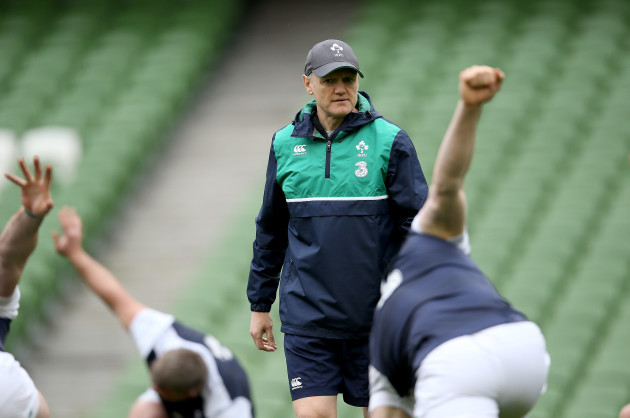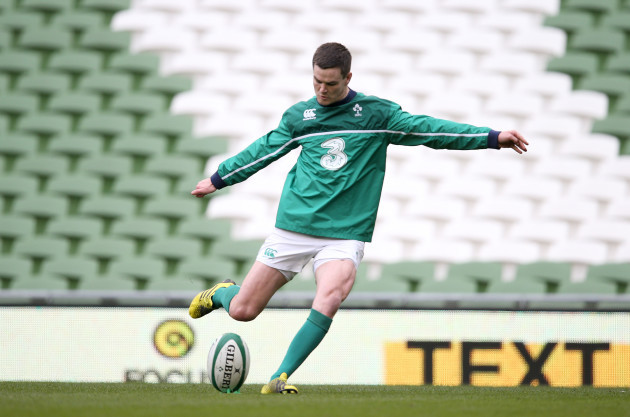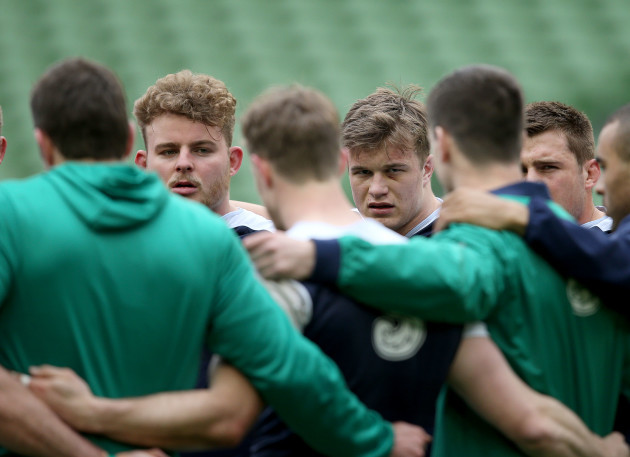THE ARRIVAL OF today’s meeting with Italy [KO 1.30pm] must come as a relief for Joe Schmidt and Ireland.
The outcome should not be taken as a foregone conclusion by the players of course, but if Ireland lose this afternoon then the ‘crisis’ klaxon will be rung. The Italians have beaten Ireland only once at the last 21 times of asking, and the less we recall of the 2013 nightmare in Rome the better.
The reality is that Ireland should fulfil their status as 24-point favourites at the Aviva Stadium, but victory on such a margin would really tell us very little in the short-term.
Nonetheless, Schmidt’s team are in desperate need of a confidence boost and a convincing win would serve exactly that cause. Major challenges lie ahead in 2016 and the tide needs to turn sooner rather than later.
Four games without a win is the worst streak in Schmidt’s tenure, and for the first time there has been running criticism of the Kiwi and his methods. What was a minority questioning Schmidt’s way is increasingly picking up support.
Expectation weighs heavily upon this group, so glaringly missing Paul O’Connell, after the 2014 and 2015 Six Nations titles.
“I think probably the biggest frustration that I’m sensing is from within our own group,” is captain Rory Best’s reply when asked whether the growing public frustration is adding pressure for Ireland.
“There’s no doubt that after we did the video review of England, when we went out to train both of those were very intense sessions just because we’re hugely frustrated that we’re making silly mistakes.
We keep putting ourselves in really good positions and then just switching off for maybe 30 seconds or 60 seconds and that’s costing us games.
“That’s something that we’ve prided ourselves on over the last two and a half years – that we played every moment, good, bad and indifferent, and we moved on. We didn’t switch in and out of games.
“Everyone’s used to Ireland winning. Everyone’s used to Ireland going into the last two rounds of the championship either in contention for the Grand Slam or needing to win two games to win a championship.
“Unfortunately, we’re not there at the minute and that is going to be frustrating for everyone, I can assure you, no one more so than us as a playing group.”
We keep hearing about the ‘fine margins’ and ‘little moments’ from Ireland, but there are many who would suggest that this team’s attacking strategy is an overriding issue in their poor run since the World Cup quarter-final.
Close analysis of Ireland’s attacking play in this Six Nations supports the argument that their strategy is not the problem. Certainly the actual structures, shapes and ideas in place are not majorly different to those of other Test sides.
Ireland’s attacking play between the two 22-metres lines has largely been effective, though their use of possession inside the opposition 22 is deservedly and logically being used as a baton with which to beat Schmidt.
The one-out stuff is grating and predictable, although Schmidt would likely point to multiple examples of his players losing possession through simple errors in that zone as having stunted potential scoring opportunities. Execution.
Regardless of that possible defence of the attack, Ireland simply have not been clinical enough. Though we cannot get into the completely honest thought processes of the players, there appears to be a muddiness in their way of thinking and Schmidt’s coaching may be part of the issue.
Let’s take Ireland’s use of rugby league-esque link passing pods against England as an example here. We’re talking about instances like Jack McGrath taking a pass from Conor Murray and then sending the ball out the back door of a decoy runner to Johnny Sexton.
Simple stuff, but Ireland’s execution even in this area is often lacking accuracy, animation and conviction. There appears to be an effort to broaden Ireland’s attacking palate, but it also looks as though Ireland’s players are not fully convinced that this is the right way.
They are second-guessing themselves at times, the lack of decisiveness showing up as poor technique or decision-making. There are split seconds available at Test level and there is no room for indecision.
Ireland seem to be caught somewhere between wanting to revert to the kick-chase, battering-ram game plan that has helped them to some of their biggest wins and a strategy based more on passing and running that has not been as successful so far.
This works both ways – there were times against both France and England when the best decision for Ireland would have been to kick the ball, but they seemed so intent on keeping possession despite moving backwards.
What role does a coach have to play in this? Well, their duty is to underline to the players that theirs is the right path. Given Schmidt’s caution around details like offloading and his foundational focus on defensive strength, we must wonder if there are mixed messages being delivered to the players.
Of course we are not privy to what it is that is being preached on the Carton House training pitch or in their meetings, but the strong sense is that there has been a negativity pervading Ireland’s efforts since their World Cup disaster against Argentina.
“We pride ourselves on the fine detail and the fine detail doesn’t come from us continually watching stuff,” says Best when you ask him if the frustration Ireland are feeling is a danger, in that it may only breed further frustration and therefore impact negatively rather than sparking a positive change.
“It comes from stuff being pointed out to us. Now that’s being pointed out in the negative for us, whereas probably in the last two and a half years it’s been the positive.
“It would have been, ’Look what we are doing here, look what we are doing here.’
“Now it’s, ‘Look what we didn’t do here.’
“That is the being reviewed in our training to go, ‘Look we asked for this. Are we getting it or are we not?’ That’s the sort of stuff that we’re doing now just to make sure that small areas of the game where we can be a lot better and we’ll probably see a vast improvement in that being addressed or applied in the right way.”
This brings us right back to the point about confidence and Ireland’s lack of it since they exited the World Cup at the hands of Argentina. This Italy game is exactly what Schmidt and his side need now, but only if they can remedy those details that they feel they have been getting wrong.
In that sense, his selection of a non-experimental XV and bench makes some sense. Omitting men he knows will play a key part in the tests to come later this year would deprive them of a chance to start building up their belief again.
“I think with hookers as well as second rows and callers, if you lose a lineout it kinda always eats at you, to be honest,” is lineout leader Devin Toner’s take on Ireland’s issues in that area against England.
An example of how confidence affects execution. We are not going to see a completely new attacking philosophy from Ireland today, even though it might be perceived as such in some quarters if Schmidt’s side do manage to run in tries.
The hope, instead, for Schmidt and his side is that their attempts to cut the opposition apart are more accurate, that the platforms that would allow them to do so – lineout and scrum – will be far more effective.
This game needs to be the start of the re-build. Otherwise, the pressure that has hastily grown on Schmidt leading up to this game will become more justified. Italy is more of a must-win and must-perform fixture than ever.
“I’ve heard Joe say that there have been elements of the last three games that we have played well and there have been chances for us to get a result, but obviously it didn’t go our way,” says Toner. “There’s pressure on.”
Ireland:
15. Simon Zebo
14. Andrew Trimble
13. Jared Payne
12. Robbie Henshaw
11. Keith Earls
10. Johnny Sexton
9. Conor Murray
1. Jack McGrath
2. Rory Best (captain)
3. Mike Ross
4. Donnacha Ryan
5. Devin Toner
6. CJ Stander
7. Josh van der Flier
8. Jamie Heaslip
Replacements:
16. Sean Cronin
17. Finlay Bealham
18. Nathan White
19. Ultan Dillane
20. Rhys Ruddock
21. Kieran Marmion
22. Ian Madigan
23. Fergus McFadden
Italy:
15. David Odiete
14. Leonardo Sarto
13. Michele Campagnaro
12. Gonzalo Garcia
11. Mattia Bellini
10. Edoardo Padovani
9. Guglielmo Palazanni
1. Andrea Lovotti
2. Davide Giazzon
3. Lorenzo Cittadini
4. George Biagi
5. Marco Fuser
6. Francesco Minto
7. Alessandro Zanni
8. Sergio Parisse (captain)
Replacements:
16. Oliviero Fabiani
17. Matteo Zanusso
18. Dario Chistolini
19. Quintin Geldenhuys
20. Abraham Steyn
21. Alberto Lucchese
22. Kelly Haimona
23. Luke McLean
Referee: Angus Gardiner [Australia].
The42 is on Snapchat! Tap the button below on your phone to add!




